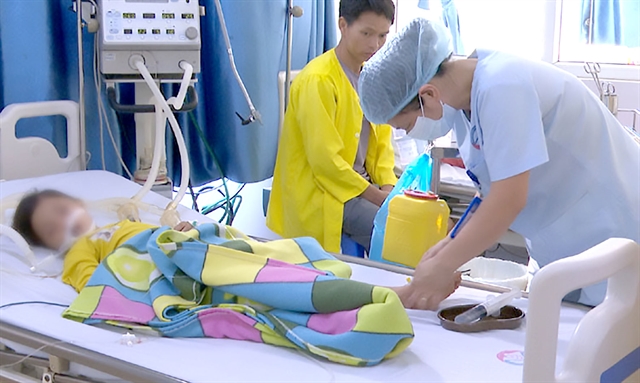 Society
Society

 |
| A child is treated for encephalitis in Lào Cai Obstetrics and Paediatric Hospital in the northern mountainous province of Lào Cai.— Photo syt.laocai.gov.vn |
LÀO CAI — Parents are being advised to pay special attention to detect possible signs of encephalitis in their children this summer, which is the season that often sees an increase in this potentially fatal disease.
Since April the Emergency Intensive Care Unit under Lào Cai Obstetrics and Paediatric Hospital has treated 16 children with encephalitis in the northern mountainous province of Lào Cai.
A boy, named C.T.L., 5, of Ngũ Chỉ Sơn Commune, Sa Pa Town, was transferred to Lào Cai Obstetrics and Paediatric Hospital on May 22, in a lethargic condition.
Six days prior, the child had developed symptoms of high fever, accompanied by headache and vomiting, so the family took him to the district-level Bát Xát General Hospital, where he was diagnosed with and treated for suspected encephalitis and meningitis.
Then the patient was transferred to Lào Cai Obstetrics and Paediatric for further treatment.
Doctors performed lumbar punctures and diagnosed the patient with encephalitis, with a poor prognosis.
Tẩn Lở Mẩy, mother of the patient, said "At first, when I took him to the hospital, I thought my child had just a normal fever.
"I did not think he could have contracted encephalitis."
He is one of the four patients with encephalitis currently being treated at the unit.
Among the four patients in the hospital, one critically ill patient has been successfully taken off mechanical ventilation and is currently recovering in preparation for leaving the hospital, while the remaining three severely ill patients are still under observation and are undergoing treatment.
Causes
According to medical experts, encephalitis is inflammation of brain tissue with many accompanying dangerous complications.
If not diagnosed and treated promptly, it can lead to severe neurological complications and even death.
In Việt Nam, infectious agents, especially viruses (or super viruses), are the common causes of encephalitis.
Common types of viruses include herpes virus, Japanese encephalitis virus, Enterovirus (type A71) causing hand, foot and mouth disease, various types of viruses causing chickenpox, measles and mumps.
Depending on the specific virus, the transmission route varies.
For instance, the herpes virus can be transmitted through oral-oral contact (Herpes type 1) or through sexual contact (Herpes type 2).
Japanese encephalitis virus is transmitted from mosquitoes to humans, with the Culex mosquito being the carrier which transmits the disease from animals such as birds, cattle and pigs to humans.
Symptoms
Every year, there are many cases of encephalitis in children of all ages, with common symptoms such as high fever, vomiting, complex seizures, limb weakness and prolonged disturbances of consciousness lasting more than 24 hours, such as lethargy or even coma.
Moreover, depending on the viral agents, children may have additional epidemiological factors and clinical manifestations suggesting common viral agents.
According to Vũ Thị Hải Yến, head of the Emergency Intensive Care Unit, under Lào Cai Obstetrics and Paediatric Hospital, it may initially differentiate encephalitis from other diseases by sudden high fever, headache, vomiting and altered consciousness.
Encephalitis is most common in children from six months to ten years old.
Due to the lack of typical symptoms of encephalitis, many parents often do not recognise the condition, leading to hospitalisation when the disease has already become severe.
Tests such as lumbar puncture to obtain cerebrospinal fluid, CT scans/MRIs of the brain, and electroencephalogram are useful means for diagnosing encephalitis.
Currently, PCR testing for multiple pathogens with cerebrospinal fluid samples is a highly sensitive and specific test that contributes to establishing a diagnosis and determining the cause of the disease.
However, not all cases of childhood encephalitis can identify specific pathogens.
The inability to identify the agent also does not rule out a diagnosis of encephalitis. In such cases, clinical evaluation and brain imaging will play a crucial role.
To prevent the disease, people need to maintain environmental hygiene, eliminate mosquito breeding sites, and parents need to observe their children, create a clean and airy living environment for them.
Additionally, children should consume cooked food, maintain regular personal hygiene, wear masks when going outside and receive all their vaccinations in the national Expanded Programme on Immunization.— VNS